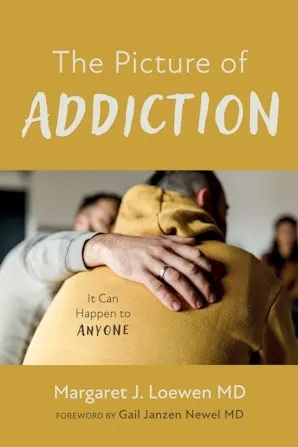
A Mother’s Fight Against the Opioid Epidemic: Margaret Loewen’s Inspiring Journey
2024-10-01
Introduction
An American emergency room physician, Margaret Loewen, is on a mission to combat the opioid epidemic through the powerful narrative of her own family’s struggle. Her new book, *The Picture of Addiction: It Can Happen to Anyone*, serves as a poignant testament to the challenges faced by those grappling with addiction and a compelling call to action for medical professionals across North America.
Margaret's Journey into Addiction
Margaret’s journey into the world of addiction began in a rural Midwest community where she initiated her medical practice. The narrative intertwines her professional insights with personal heartache, revealing the tragic tale of her son Chris, who fell victim to heroin addiction. As she fought to save her son from the grips of addiction, she also sought to implement innovative treatments that could potentially save countless lives.
Background and Family History
Though Margaret has a distant connection to Steinbach, where she was born to Melvin and Elfrieda Loewen, her journey took her far from her roots. Her family’s missionary work in Congo was interrupted by a civil rebellion, and they retreated back to Steinbach, where Margaret completed part of her fifth-grade education before moving on. Now, practicing medicine in the American Midwest, she felt compelled to share her story to shed light on the opioid crisis.
Collaboration and Forward by Gail Janzen Newel
In her book, Margaret recounts how she collaborated with her colleague Gail Janzen Newel, who tragically lost her own child to an opioid overdose. Although Janzen Newel did not co-author the book, her forward poignantly captures the pain of losing a child to addiction, adding depth to Margaret's account. 'She was still grappling with the trauma of her loss,' Margaret notes, emphasizing the varied experiences of families affected by this crisis.
Chris's Recovery Journey
Her son, referred to as Bez in the book, is now thriving after beginning his recovery in 2020. Margaret began documenting their journey in 2016, but it wasn't until Chris was well on the path to healing that she felt ready to share their story publicly. The breakthrough came when Chris himself encouraged Margaret to write the book, recognizing its potential to help others.
The Realities of Addiction
The narrative doesn’t sugarcoat the grim realities of addiction, detailing the despair and dangers Chris faced, as well as the profound impact on their family. Margaret considers Chris a hero for his openness and willingness to advocate for addiction awareness. By framing addiction as a disease rather than a moral failing, she aims to reduce the stigma often associated with it. Her book includes crucial insights into how advancements in neuroscience are reshaping treatment approaches.
Advocacy for Emergency Medicine Practices
As she approached publication, Margaret realized the need to reach out to emergency medicine practitioners, emphasizing their crucial role in addressing the opioid crisis. Her groundbreaking work with buprenorphine—a medication to manage opioid withdrawal—illustrates how emergency departments can serve as frontline responders to this epidemic. By administering the first dose of buprenorphine in emergency settings and connecting patients to outpatient resources, she believes that lives could be saved and recovery facilitated.
Challenges in Hospital Protocols
Despite the pressing need for change, Margaret acknowledges that many hospitals remain hesitant to adopt these protocols, often fearing an influx of patients seeking help. However, she shares that her own hospital experienced a welcoming response to their new strategies, successfully aiding numerous individuals battling addiction.
Statistics and the Importance of Change
With the opioid crisis still rampant—statistics suggest that the U.S. had a staggering opioid-related death rate of 15.4 per 100,000 in 2021, with Canada closely following at 6.9—Margaret’s push for broad adoption of medication-assisted treatment in emergency services is crucial. She hopes her book resonates not only with the general public but also with healthcare professionals, fostering a deeper understanding of addiction and its treatment.
Margaret's Advocacy and Speaking Engagements
Currently, Margaret is set to speak at the Health Officers Annual Conference in Riverside, California, sharing her insights and advocating for systemic changes in how addiction is approached in medical settings. Through both her personal and professional experiences, she aims to be an advocate for change, hoping that her story will prevent future tragedies in Canada and elsewhere.
Conclusion
*The Picture of Addiction: It Can Happen to Anyone* is now available on Amazon and at bookstores, standing as a vital resource for those seeking to understand and combat the opioid crisis in their communities.









 Brasil (PT)
Brasil (PT)
 Canada (EN)
Canada (EN)
 Chile (ES)
Chile (ES)
 España (ES)
España (ES)
 France (FR)
France (FR)
 Hong Kong (EN)
Hong Kong (EN)
 Italia (IT)
Italia (IT)
 日本 (JA)
日本 (JA)
 Magyarország (HU)
Magyarország (HU)
 Norge (NO)
Norge (NO)
 Polska (PL)
Polska (PL)
 Schweiz (DE)
Schweiz (DE)
 Singapore (EN)
Singapore (EN)
 Sverige (SV)
Sverige (SV)
 Suomi (FI)
Suomi (FI)
 Türkiye (TR)
Türkiye (TR)